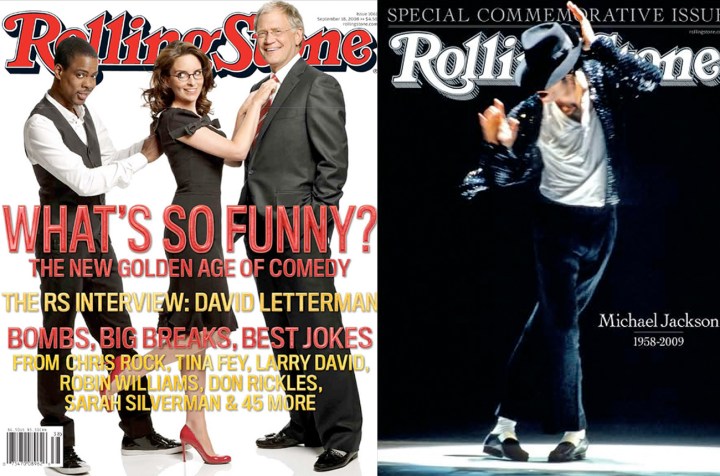Business Maverick, Media, Politics
Rolling Stone’s Web illiteracy: What would Hunter have done?

The magazine launched by Jann Wenner in the late ’60s and made famous by Hunter S. Thompson in the early ’70s has always prided itself on its agenda-setting political stories. The latest one has felled General Stanley McChrystal. Still, Rolling Stone doesn’t know how the internet works, so they gave the story away.
It may have been founded in 1967 as a music and popular culture magazine, but by the beginning of the ’70s Rolling Stone was already pissing off the US administration. The main culprits were Hunter S. Thompson and Ralph Steadman, the drugs-and-bourbon-addled inventor of gonzo and his hapless illustrator sidekick, and what they did to get the goat of the Washington bigwigs is now the stuff of legend. For example, during the 1972 Republican Convention in Miami, sensing through the mist that the incumbent president and his Party stunk, Steadman splashed the following across the skyline of one of his iconic drawings: “AMERICANS DON’T WANT THE CLEANEST WASH – THEY JUST WANT THE WHITEST.”
Despite Thompson’s consistent injunctions that Steadman should stick to cartoons – “Don’t write, Ralph, you’ll bring shame on your family” – the suicide of his friend in 2005 prompted the illustrator to ignore the advice, mainly because he knew that he was finally out of harm’s way. The resulting memoir, The Joke’s Over, although not an altogether literary piece of work, is nonetheless incredibly funny and deeply insightful, detailing as it does the background to the stories that the two men worked on together.
One such story, of course, was the abovementioned Miami Convention, and Steadman remembers that at the time a paranoiac disease was consuming Nixon’s government and the American body politic. “Watergate was merely the symptom of the disease,” recalls Steadman.
Then he explains how Thompson’s coverage of the Watergate hearings, considered amongst the most important political reportage of the era, took place mainly at the poolside of the Washington Hilton.
“There we were sitting around the pool of the Washington Hilton, watching a tiny black and white TV screen, a nifty, new, little model that Hunter had bought ‘to keep a handle on the Watergate hearings at all cost’. He was busy haggling with an electronics salesman he had summoned to the poolside. The man was definitely confident of a sale. He had arrived in a slick suit carrying a large suitcase full of devices designed to make life bearable: bugging devices, miniature tape recorders, directional mikes and a small briefcase complete with portable phone, the purchase of which Hunter was seriously trying to negotiate and put on hotel expenses. ‘Can you imagine having a little fucker like that, and you are lost in the desert? It could get you out of some serious trouble. It is a vital piece of equipment for people like us, Ralph – and it’s only two thousand dollars!’”

Photo: Journalist Hunter S. Thompson enters a New York television studio on June 10 for an interview with talk-show host Charlie Rose. Thompson’s published book, The Proud Highway; Saga of a Desperate Southern Gentleman, was the first of three volumes of collected letters spanning 40 years of his career. REUTERS/Christian Thompson
Jann Wenner, Rolling Stone’s editor and publisher, didn’t approve the expense and Thompson couldn’t have his toys, but the very fact that he was in a lavish hotel considering the purchase speaks of a sadly lost age in magazine journalism where the story was everything and the writer was God (the bit about the portable phone speaks, too, of Thompson’s latent genius as a technology forecaster). Nowadays, you’re lucky if the publisher of a long-form title, even a famous one, ponies up for a BLT and a Coke.
Still, Thompson’s stories (the ones he published, as much as the ones about him) cemented Rolling Stone’s reputation as a title with severe political clout, and over the decades the magazine has done its best to live up to this mythological status. Some outstanding examples from the post-Hunter years include David Foster Wallace’s 2000 piece on John McCain, where he likened Larry King to a giant bug while casting McCain himself as “somewhat in the ballpark of a real human being.” Another was a 2008 profile of McCain, written by Tim Dickinson, where the presidential candidate was torn a new one as an exploitative and manipulative solipsist who never had an empathetic emotion in his life. In a significant way, Foster Wallace’s piece, widely circulated over the ensuing years as it was, fed the confidence of thousands of Americans in McCain’s ability to govern – a confidence that Dickinson’s piece, equally influential, destroyed.
That neither of these pieces is still available on the Rolling Stone Website reveals the extent to which the title remains stuck in the Hunter period, both in terms of its image of itself and in terms of its new media nous. It’s well known by now that the resignation last week of General Stanley McChrystal was directly brought about by the feature in Rolling Stone of freelance writer Michael Hastings, who, drawing on an interview with McChrystal, exposed the disdain of the general and his staff for the Obama administration. Less well known is how Rolling Stone completely missed the opportunity to control and dominate their own breaking story, ceding it instead to media brands who actually know how the Internet works.
As noted by Guardian journalist Emily Bell, Rolling Stone decided that the best way to profit from the scoop would be to let other outlets run with the bones, while they’d come three days later with the meat as the issue hit newsstands. Attendant with such logic was that their Website wouldn’t carry the story. The inevitable Web explosion, however, forced them to post the piece online after almost everybody in America knew the facts.
Writes Bell: “The problem Rolling Stone encountered was a direct result of not understanding what the purpose of its Web presence is. If it understood it to be marketing – to lure subscribers, engage readers, advertise writers, trail its content – then it ought to have been very explicit which route to take, and presumably that would not have included handing all its marketing over to other outlets. If, however, the primary purpose was to raise advertising, gather readers and distribute content, then it should also have been clear that some form of publication of the material was better than none.”
Would Hunter have cared at all about this quandary? Not on your life. In all likelihood, he’d have put the phone down, taken a big swig of Wild Turkey, and resumed shooting at the sharks in the bay from his hotel room window. The core problem for the illustrious publication may be that Jann Wenner seems not to have moved beyond this selfsame question: what would Hunter have done?
By Kevin Bloom
Read more: The Guardian


















 Become an Insider
Become an Insider